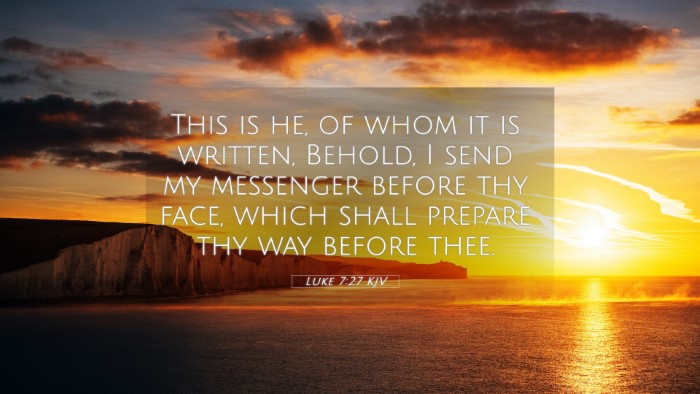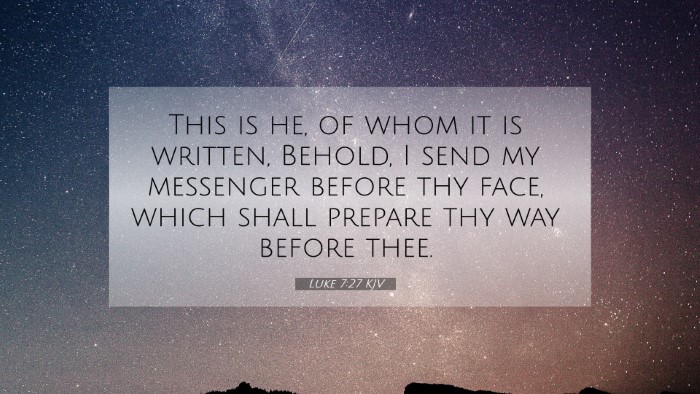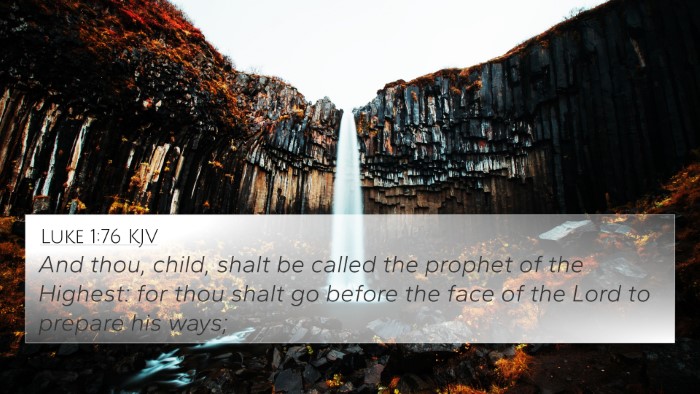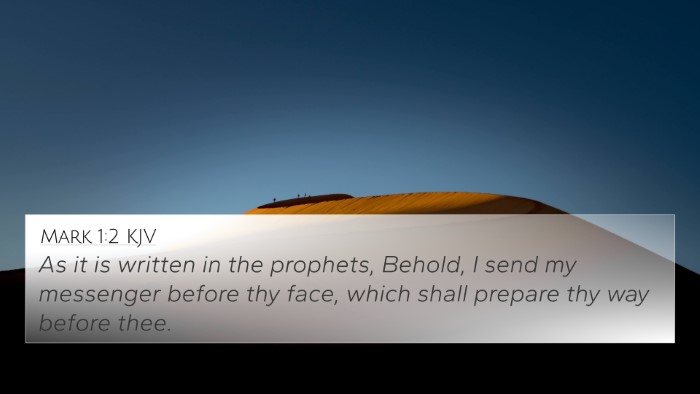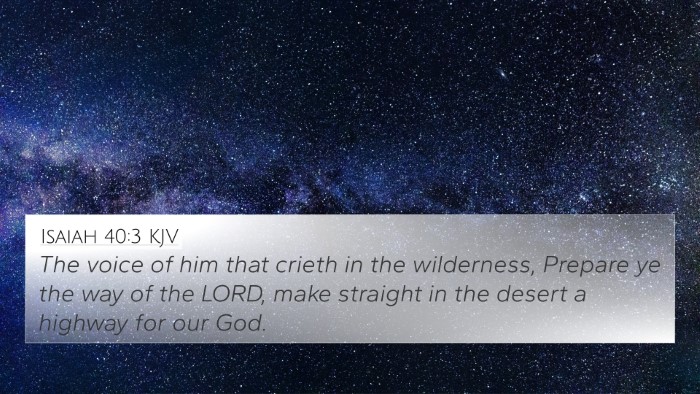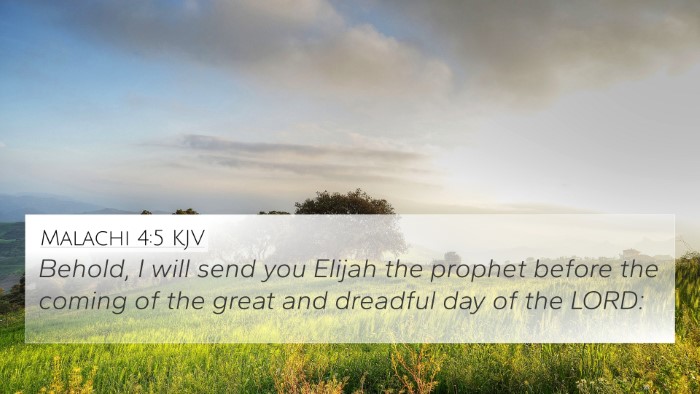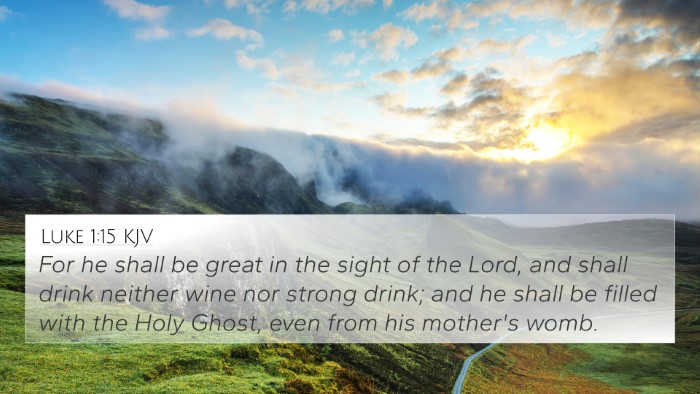Understanding Luke 7:27
Bible Verse: Luke 7:27 - "This is he of whom it is written, Behold, I send my messenger before thy face, which shall prepare thy way before thee."
Summary of Meaning
This verse is a profound statement identifying John the Baptist as the messenger prophesied in the Old Testament, particularly in Malachi 3:1. The significance of his role is emphasized by the divine mission entrusted to him, which is to prepare the way for the coming of Jesus Christ. By recognizing John as the forerunner, Luke highlights the continuity of God's plan throughout scripture.
Combined Insights from Commentaries
- Matthew Henry: Henry notes that John the Baptist fulfills a prophetic role, outlined in scripture, indicating the importance of a precursor to the Messiah. His ministry was crucial for setting the stage for Christ's arrival.
- Albert Barnes: Barnes emphasizes the prophetic fulfillment aspect of this verse, showing that the coming of Christ was anticipated and structured according to God’s plan. He connects the verse to the importance of John in preparing hearts for repentance and acceptance of Jesus.
- Adam Clarke: Clarke interprets the reference to the messenger as a highlight of divine arrangement, where God sends His messenger to awaken a sense of spiritual need among the people, preparing them for the Gospel message.
Thematic Connections in Scripture
Luke 7:27 provides a link that resonates throughout the Scriptures, particularly among the prophetic texts of the Old Testament and the New Testament accounts of Jesus' ministry. Here are some crucial Bible cross-references:
- Malachi 3:1: "Behold, I send my messenger, and he will prepare the way before me." This directly identifies the prophetic nature of John's mission.
- Isaiah 40:3: "The voice of him that crieth in the wilderness, Prepare ye the way of the LORD." This prophecy further establishes the expectation of a forerunner.
- Matthew 3:3: "For this is he that was spoken of by the prophet Esaias, saying, The voice of one crying in the wilderness..." Matthew also affirms John’s role as prophesied.
- Mark 1:2-3: Parallels the same prophetic basis for John's ministry as seen in the prior Gospels.
- Luke 1:76: "And thou, child, shalt be called the prophet of the Highest..." illustrating John's role as a prophet who announces the coming Messiah.
- John 1:23: John explicitly states, "I am the voice of one crying in the wilderness, Make straight the way of the Lord." This reinforces his identity as the messenger foretold.
- Acts 13:24-25: Discusses John’s preaching and his acknowledgment of his role before the arrival of Jesus.
- Revelation 14:6: Alludes to the ongoing message of preparation for Christ’s return, reflecting the theme started by John.
The Importance of Cross-Referencing
Understanding the connections between Bible verses is essential for deepening one’s understanding of Scripture. The verse Luke 7:27 can be thoroughly explored through tools for Bible cross-referencing. Utilizing Bible concordance and Bible cross-reference guides can unveil thematic links between the Old and New Testament, showcasing how each part of the Bible interrelates.
How to Use Cross-References Effectively
Exploring the connections between the verses not only enhances comprehension but also facilitates a richer devotional experience. When studying passages like Luke 7:27, one can:
- Start by identifying key terms (e.g., messenger, prepare) and searching for instances in the Bible where these terms are used.
- Look for Old Testament prophecies and compare them with their New Testament fulfillments.
- Utilize cross-reference Bible study methods that focus on similar themes or characters in different contexts.
- Compile Bible reference resources that aid in recognizing patterns and prophecies throughout the Biblical narrative.
Conclusion
Luke 7:27 is a pivotal verse that bridges the prophetic messages of the Old Testament with the reality of Jesus’ ministry as portrayed in the New Testament. By engaging in comparative Bible verse analysis, believers can uncover the rich tapestry of God's salvific plan, illustrated through the prophetic mission of John the Baptist.

